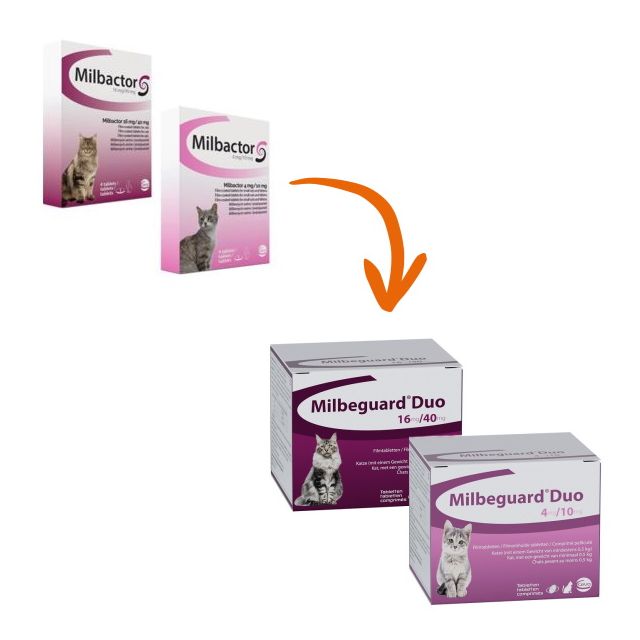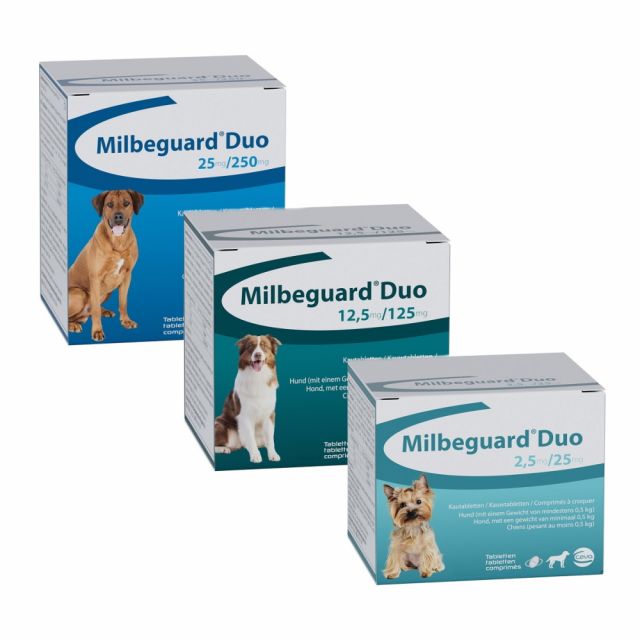Milbactor - Tablets - Eye drops
Milbactor is an effective deworming treatment for dogs and cats, specially developed to effectively combat the most common worm infections. The product is suitable for pets of all sizes. Milbactor for dogs and Milbactor for cats tablets are easy to administer and provide optimal protection for your pet.
Active ingredients
The active ingredients in Milbactor are Milbemycin oxime and Praziquantel. Milbemycin oxime targets various types of worms, such as roundworms (including lungworm), hookworms, and whipworms, and also provides protection against heartworm. Praziquantel is effective against tapeworm infections, including the fox tapeworm (Echinococcus).
Why is it important to deworm dogs and cats?
Dogs and cats can contract worms from their environment, mother’s milk, other animals, or by eating prey such as mice and snails. Worm infections can cause symptoms such as diarrhea, weight loss, vomiting, stunted growth in puppies and kittens, coughing, and weakened immunity. Some worms can also pose a health risk to humans. To protect both your pet and your family, regular deworming or fecal testing of your pet is important.
Administration and dosage of Milbactor
Milbactor tablets are administered orally and should be given with some food or shortly after a meal. Thanks to their palatable formulation, they are usually well accepted. The tablets for small dogs and cats are divisible, making it easy to adjust the correct dosage.
Dosage Milbactor for Dogs
| Weight | Milbactor for small dogs and puppies | Milbactor for dogs |
| 0.5 – 1 kg | ½ tablet | |
| 1 – 5 kg | 1 tablet | |
| 5 – 10 kg | 2 tablets | |
| 10 – 25 kg | 1 tablet | |
| 25 – 50 kg | 2 tablets | |
| 50 – 75 kg | 3 tablets |
For more information, consult the package leaflet of Milbactor for dogs.
Dosage Milbactor for Cats
| Weight | Milbactor for small cats and kittens | Milbactor for cats |
| 0.5 – 1 kg | ½ tablet | |
| 1 – 2 kg | 1 tablet | |
| 2 – 4 kg | ½ tablet | |
| 4 – 8 kg | 1 tablet | |
| 8 – 12 kg | 1 ½ tablets |
For more information, consult the package leaflet of Milbactor for cats.
How often should you deworm your pet?
The frequency of deworming depends on your pet’s age, lifestyle, and living environment. The following general advice applies:
- Adult dogs and adult cats: deworm on average 4 times per year. Animals that go outdoors frequently, hunt, or eat raw meat may require more frequent deworming. Also, if you live in or are traveling to an area where heartworm or Echinococcus is present, more frequent deworming may be advisable.
- Puppies: deworm at 2, 4, 6, and 8 weeks of age. Continue monthly until 6 months old.
- Kittens: start deworming at 3 weeks of age and repeat every 2 weeks until 2 weeks after weaning. Then continue monthly until 6 months old.
For personalized advice tailored to your animal, it is best to consult your veterinarian.
Medications and supplements alongside Milbactor
In addition to internal parasites, dogs and cats are also affected by external parasites such as fleas, ticks, mites, and sandflies. Flea and worm infestations often occur simultaneously because some tapeworms use fleas as intermediate hosts. Protection against fleas is therefore essential. Products such as Advantage or Adtab help keep your cat or dog free of these parasites. We are happy to advise you on protection against external parasites in dogs and external parasites in cats.
Often, you won't notice any symptoms when your cat or dog is infected with worms. However, worm infections can sometimes cause diarrhea or other digestive issues such as vomiting. Probiotics such as Protexin Pro-Kolin Advanced, Purina Pro Plan FortiFlora Dog, or Purina Pro Plan FortiFlora Cat provide good support for your pet’s intestines alongside Milbactor deworming. Water-binding psyllium fibers in Iso-Gel help to firm up the stool.
If you have any questions about Milbactor or deworming your dog or cat, please contact us.





